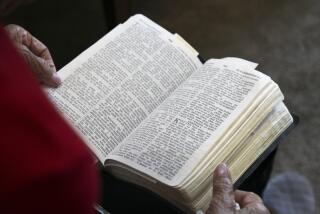Feminist Views Reshaping Bible Scholarship
- Share via
A quiet revolution is reshaping the arcane world of biblical scholarship, a field rarely visited by lay people because of daunting terminology and methodology, where erudite scholars use phrases like “hermeneutic of suspicion” to mean a skeptical interpretation.
Feminist scholarship is taking hold--and in the process, challenging age-old interpretations of everything, from the story of Genesis as justifying women’s subordination to assertions that women have never performed priestly functions, to portrayals of Mary Magdalene as a whore.
In “The Word According to Eve,” such startling scholarship is unveiled for us by a guide and translator with good humor, graceful prose and formidable intellect: Cullen Murphy, managing editor of the Atlantic Monthly, who has covered religion for more than a decade.
Murphy does not claim to be a disinterested party. A Roman Catholic “unembittered by the sting of personal grievance,” he nonetheless openly hopes and expects that one day his daughter will be able to worship in a denomination that no longer restricts the role of women.
Murphy cuts through the field’s intimidating intellectual thickets and brings us vivid, humanistic portraits of the women, and a few men, who have pioneered the most exciting feminist biblical work.
We meet the feisty, caustic, 240-pound Elizabeth Cady Stanton, who scandalized many of her fellow suffragettes in 1895 by publishing the “Woman’s Bible.” Phyllis Trible of Wake Forest University has labored to reclaim the patriarchal Bible as a spiritual resource for women through scholarship on such figures as Eve and Miriam, Moses’ sister, whom many feminist scholars see as having played a larger leadership role than has been commonly asserted.
Elisabeth Schussler Fiorenza, a Harvard divinity professor, has combed the early Christian and Jewish texts to conclude that early Christianity was built around a theology of equality. Karen King, formerly of Occidental College, now of Harvard, has helped reshape the understanding of Mary Magdalene as a significant church leader through mastery of such documents as the 1,500-year-old papyrus records known as the Nag Hammadi library, which were discovered in 1945.
Murphy also brings us to the ancient holy lands and opens up such fascinating worlds as biblical archeology through such figures as Carol Meyers of Duke University. Meyers has pushed forward scholarship into women’s roles in rural areas and the private spheres of home, which get short shrift in the Bible. “I think the idea of patriarchal, male dominance [portrayed in the Bible] needs to be contested,” she said. “Certainly in rural settings, in the extended family household, senior women had a great deal of power and authority.”
Through portraits of these women, Murphy brings us into tantalizing debates. Was Jesus a feminist? Was Mary a virgin? Did women once serve as priests? Did a woman, or women, write parts of the Bible? He also writes of the ends to which church leaders have gone to minimize the role of women--even summarily changing the gender of some who are mentioned as leaders in the Bible, making them male, rather than female. For example, a figure named Junia, who is found in the New Testament and ancient documents that appear to have been biblical source texts, appears in later editions of the Bible as Junias, a male name.
Trible and other women have voiced frustration over whether their efforts will ultimately make any difference, but Murphy is confident that they will. Not only are more women flocking to the ministry and seminaries, but moves are growing to replace sexist biblical language with gender-neutral terms.
Murphy writes: “I once asked David Tracy, the prominent Catholic theologian, what he thought would be the result of feminism’s encounter with religion, and he said simply, “The next intellectual revolution.” It is an assessment the author cautiously shares.
Despite Murphy’s prodigious talents, the book is not a breezy read. It takes determination, or a burning desire to know, to slog through explanations on the different kinds of biblical scholarship, the theological arguments and counter-arguments. Even Murphy at times surrenders: Confronted with dense methodological discussions, such as those penned by the formidable feminist literary critic Mieke Bal, he says, “The temptation is just to sprawl in the sand and wait for help.”
Still, those who have turned away from mainstream Christianity or Judaism feeling diminished as women, or those yearning for a more inclusive interpretation of their faith, will find inspiration and hope in the scholarship this book opens up to the lay public.
More to Read
Sign up for our Book Club newsletter
Get the latest news, events and more from the Los Angeles Times Book Club, and help us get L.A. reading and talking.
You may occasionally receive promotional content from the Los Angeles Times.









